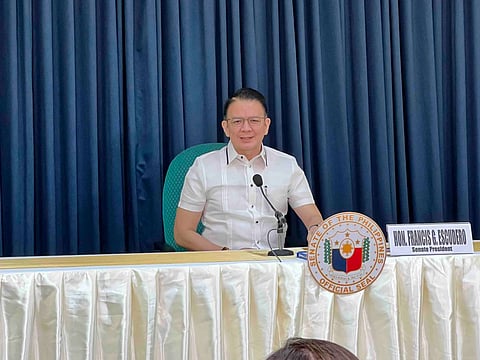
- NEWS
- the EDIT
- COMMENTARY
- BUSINESS
- LIFE
- SHOW
- ACTION
- GLOBAL GOALS
- SNAPS
- DYARYO TIRADA
- MORE

Senate President Francis “Chiz” G. Escudero on Monday lauded the enactment of the “Konektadong Pinoy” Law, a landmark measure that aims to lower internet costs and expand access to affordable, reliable connectivity across the Philippines, especially in far-flung and underserved communities.
The newly signed law, officially titled the Open Access in Data Transmission Act, was identified as a priority bill under the Marcos administration’s digitalization agenda.
It is designed to foster competition by simplifying entry for new and smaller players into the telecommunications and internet service industry, without the need for a legislative franchise.
Escudero called the measure a “giant step” toward bridging the country’s longstanding digital divide.
“The Philippines has one of the highest internet connectivity costs in the world, considering the speeds it offers,” Escudero said.
“But more than bringing down the rates, the Konektadong Pinoy Act is about providing greater access to information and markets to Filipinos who live far from the cities and in remote areas.”
The Senate chief highlighted the law’s potential impact on critical sectors, particularly education, where fast and affordable internet access has become a necessity.
He lamented the current state of service, describing it as “mahal na, mabagal pa at hindi reliable” (expensive, slow, and unreliable).
“Ang pinakamasaklap, ang mga lugar sa Pilipinas na matagal nang nagmamakaawa na magkaroon ng internet ay hindi pa din natutugunan hanggang ngayon (The saddest part is that there are places in the Philippines that have long been begging for internet access, and yet their needs remain unmet to this day),” he added.
“It is about time that we empower Filipinos through greater access to information and connectivity.”
A key feature of the law is the infrastructure-sharing provision, which allows new providers to use existing facilities to roll out services more efficiently—cutting down on both costs and deployment time.
This is expected to accelerate the delivery of internet services even in remote barangays.
The bill received broad support from multiple sectors, including local and foreign businesses, as well as tech and education advocates, all rallying behind its inclusive and pro-consumer goals.
Escudero expressed optimism that the country’s telecommunications giants would cooperate in implementing the law, emphasizing the shared responsibility of enabling digital growth.
“We will see a faster rollout of long-overdue internet connectivity services in every town and barrio in the Philippines,” Escudero said.
“Hopefully, our industry giants will support the implementation of the law and work with the government as partners of growth and digital inclusivity for all Filipinos,” he added.
